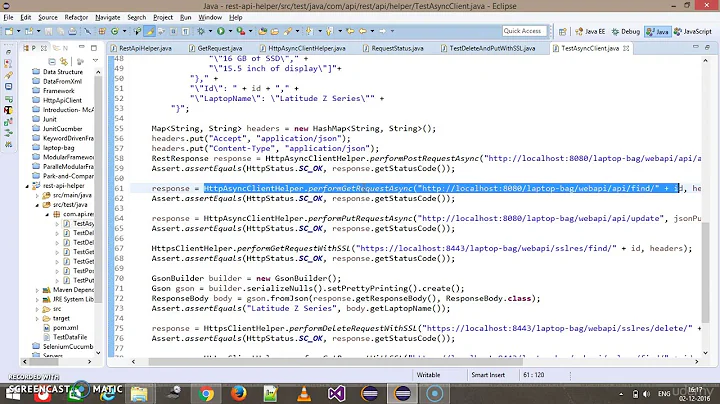What is the difference between CloseableHttpClient and HttpClient in Apache HttpClient API?
Solution 1
- The main entry point of the HttpClient API is the HttpClient interface.
- The most essential function of HttpClient is to execute HTTP methods.
- Execution of an HTTP method involves one or several HTTP request / HTTP response exchanges, usually handled internally by HttpClient.
- CloseableHttpClient is an abstract class which is the base implementation of HttpClient that also implements java.io.Closeable.
-
Here is an example of request execution process in its simplest form:
CloseableHttpClient httpclient = HttpClients.createDefault(); HttpGet httpget = new HttpGet("http://localhost/"); CloseableHttpResponse response = httpclient.execute(httpget); try { //do something } finally { response.close(); }
-
HttpClient resource deallocation: When an instance CloseableHttpClient is no longer needed and is about to go out of scope the connection manager associated with it must be shut down by calling the CloseableHttpClient#close() method.
CloseableHttpClient httpclient = HttpClients.createDefault(); try { //do something } finally { httpclient.close(); }
see the Reference to learn fundamentals.
@Scadge Since Java 7, Use of try-with-resources statement ensures that each resource is closed at the end of the statement. It can be used both for the client and for each response
try(CloseableHttpClient httpclient = HttpClients.createDefault()){
// e.g. do this many times
try (CloseableHttpResponse response = httpclient.execute(httpget)) {
//do something
}
//do something else with httpclient here
}
Solution 2
Had the same question. The other answers don't seem to address why close() is really necessary? Also, Op seemed to be struggling to figure out the preferred way to work with HttpClient, et al.
According to Apache:
// The underlying HTTP connection is still held by the response object
// to allow the response content to be streamed directly from the network socket.
// In order to ensure correct deallocation of system resources
// the user MUST call CloseableHttpResponse#close() from a finally clause.
In addition, the relationships go as follows:
HttpClient(interface)implemented by:
CloseableHttpClient- ThreadSafe.
DefaultHttpClient- ThreadSafe BUT deprecated, useHttpClientBuilderinstead.
HttpClientBuilder- NOT ThreadSafe, BUT creates ThreadSafeCloseableHttpClient.
- Use to create CUSTOM
CloseableHttpClient.
HttpClients- NOT ThreadSafe, BUT creates ThreadSafeCloseableHttpClient.
- Use to create DEFAULT or MINIMAL
CloseableHttpClient.
The preferred way according to Apache:
CloseableHttpClient httpclient = HttpClients.createDefault();
The example they give does httpclient.close() in the finally clause, and also makes use of ResponseHandler as well.
As an alternative, the way mkyong does it is a bit interesting, as well:
HttpClient client = HttpClientBuilder.create().build();
He doesn't show a client.close() call but I would think it is necessary, since client is still an instance of CloseableHttpClient.
Solution 3
The other answers don't seem to address why close() is really necessary? * 2
Doubt on the answer "HttpClient resource deallocation".
It is mentioned in old 3.x httpcomponents doc, which is long back and has a lot difference from 4.x HC. Besides the explanation is so brief that doesn't say what this underlying resource is.
I did some research on 4.5.2 release source code, found the implementations of CloseableHttpClient:close() basically only closes its connection manager.
(FYI) That's why when you use a shared PoolingClientConnectionManager and call client close(), exception java.lang.IllegalStateException: Connection pool shut down will occur. To avoid, setConnectionManagerShared works.
I prefer not do CloseableHttpClient:close() after every single request
I used to create a new http client instance when doing request and finally close it. In this case, it'd better not to call close(). Since, if connection manager doesn't have "shared" flag, it'll be shutdown, which is too expensive for a single request.
In fact, I also found in library clj-http, a Clojure wrapper over Apache HC 4.5, doesn't call close() at all. See func request in file core.clj
Solution 4
HttpClient is not a class, it is an interface. You cannot use it for development in the way you mean.
What you want is a class that implements the HttpClient interface, and that is CloseableHttpClient.
Solution 5
In the next major version of the library HttpClient interface is going to extend Closeable. Until then it is recommended to use CloseableHttpClient if compatibility with earlier 4.x versions (4.0, 4.1 and 4.2) is not required.
Related videos on Youtube
Nayana Adassuriya
Updated on March 13, 2020Comments
-
 Nayana Adassuriya about 4 years
Nayana Adassuriya about 4 yearsI'm studying an application developed by our company. It uses the Apache HttpClient library. In the source code it uses the
HttpClientclass to create instances to connect to a server.I want to learn about Apache HttpClient and I've gone trough this set of examples. All the examples use
CloseableHttpClientinstead ofHttpClient. So I thinkCloseableHttpClientis an extended version ofHttpClient. If this is the case I have two questions:- What is the difference between these two?
- Which class is recommended to use for my new development?
-
Jon Skeet over 10 yearsThe documentation seems pretty clear to me: "Base implementation of HttpClient that also implements Closeable" - HttpClient is an interface; CloseableHttpClient is an abstract class, but because it implements AutoCloseable you can use it in a try-with-resources statement.
-
Jules about 10 years@JonSkeet That much is clear, but how important is it to close
HttpClientinstances? If it's important, why is theclose()method not part of the basic interface? -
Jon Skeet about 10 years@Jules: I'm afraid I don't know enough about HttpClient to answer that :(
-
 Jeril Kuruvila over 4 yearsclose need not be part of basic interface since underlying connection is released back to the connection manager automatically
Jeril Kuruvila over 4 yearsclose need not be part of basic interface since underlying connection is released back to the connection manager automatically
-
 gilbertpilz almost 9 yearsThis answer sort of begs the question. What does calling close() on an HttpClient cause to happen that wouldn't otherwise happen? Do you leak connections if you don't call close() at the appropriate times/places? Does calling close() prematurely affect your performance by causing you to reconnect when you really didn't need to?
gilbertpilz almost 9 yearsThis answer sort of begs the question. What does calling close() on an HttpClient cause to happen that wouldn't otherwise happen? Do you leak connections if you don't call close() at the appropriate times/places? Does calling close() prematurely affect your performance by causing you to reconnect when you really didn't need to? -
 Deadron over 7 yearsI looked through the code in httpclient for the answer to this question. The answer is that the close method is used to close internal state. Some of the implementations of HTTPClient(in the httpclient lib) can be configured to use persistent resources such as PooledHttpClientConnectionManager for pooled connections and without such a method you could not clean up these resources if needed.
Deadron over 7 yearsI looked through the code in httpclient for the answer to this question. The answer is that the close method is used to close internal state. Some of the implementations of HTTPClient(in the httpclient lib) can be configured to use persistent resources such as PooledHttpClientConnectionManager for pooled connections and without such a method you could not clean up these resources if needed. -
 Kasun Siyambalapitiya over 7 years@SugarPudi in the above example, do we need to close
Kasun Siyambalapitiya over 7 years@SugarPudi in the above example, do we need to closehttpgetalso -
zyfo2 over 6 yearsCould you clarify why it's better than use setConnectionManagerShared and call close() after every request?
-
illcar over 6 yearsHow are we able to invoke methods on abstract class (CloseableHttpClient) here? Should we not create a concrete subclass first?
-
 Sagar Pudi over 6 years@illcar Please go throuth this answer to understand the concept stackoverflow.com/a/4321402/2830834
Sagar Pudi over 6 years@illcar Please go throuth this answer to understand the concept stackoverflow.com/a/4321402/2830834 -
Christophe Roussy over 6 yearsIf you have set a connection pool it will close it ! Once close you would have to create a new instance each time ... Also see hc.apache.org/httpcomponents-client-ga/tutorial/html/…
-
jamie over 5 yearsThe main benefit, IMHO, is that the execute methods return CloseableHttpResponse instances, rather than HttpReponses. Use the try-with-resources for the execute calls to ensure that the connections are returned to the connection pool.
-
 chill appreciator over 4 yearsWhat about
chill appreciator over 4 yearsWhat aboutHttpGetobject? Do we need to close it? -
Vivek Chavda about 4 yearsThis still doesn't seem to answer "how important is it to close HttpClient instances?"
-
Jaraws almost 4 yearsWhat if there is an exception and in that case closable response object will be null? How do we release the connection is such a scenario if I am not using try with resources? As I can not call response.close() now. Thanks
-
 Hakanai over 2 yearsHistory says that you were wrong, because here we are in v5.1 and HttpClient still does not extend Closeable hc.apache.org/httpcomponents-client-5.1.x/current/httpclient5/…
Hakanai over 2 yearsHistory says that you were wrong, because here we are in v5.1 and HttpClient still does not extend Closeable hc.apache.org/httpcomponents-client-5.1.x/current/httpclient5/… -
 Hakanai over 2 yearsThis answer implies that you don't have to close HttpClient instances at all, which in turn implies that CloseableHttpClient was simply a mistake.
Hakanai over 2 yearsThis answer implies that you don't have to close HttpClient instances at all, which in turn implies that CloseableHttpClient was simply a mistake. -
 Hakanai over 2 yearsI guess the summary here is that the Apache HTTP Client developers don't know how to make a good API. A good API would decide whether cleaning up resources is important or not. If it were important, then HttpClient would extend Closeable. If it were not important, then HttpClient would not extend Closeable and CloseableHttpClient would not exist. I assume they are just unable to decide which direction to go in.
Hakanai over 2 yearsI guess the summary here is that the Apache HTTP Client developers don't know how to make a good API. A good API would decide whether cleaning up resources is important or not. If it were important, then HttpClient would extend Closeable. If it were not important, then HttpClient would not extend Closeable and CloseableHttpClient would not exist. I assume they are just unable to decide which direction to go in. -
SirHawrk almost 2 years
HttpClientBuilder.create().build();is whatHttpClients.createDefault();uses under the hood, so there shouldn't be a difference.









